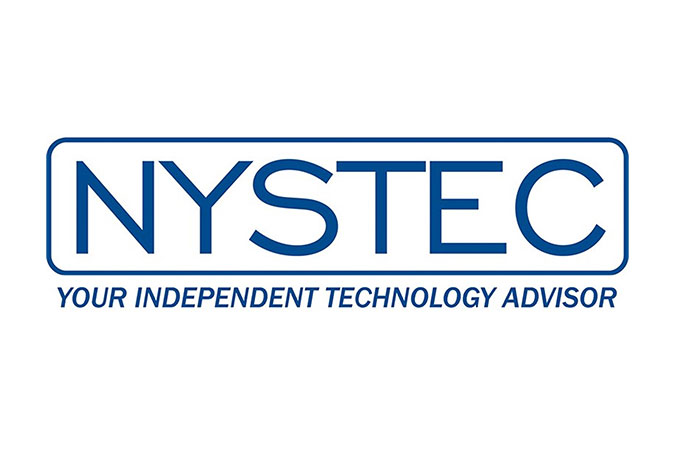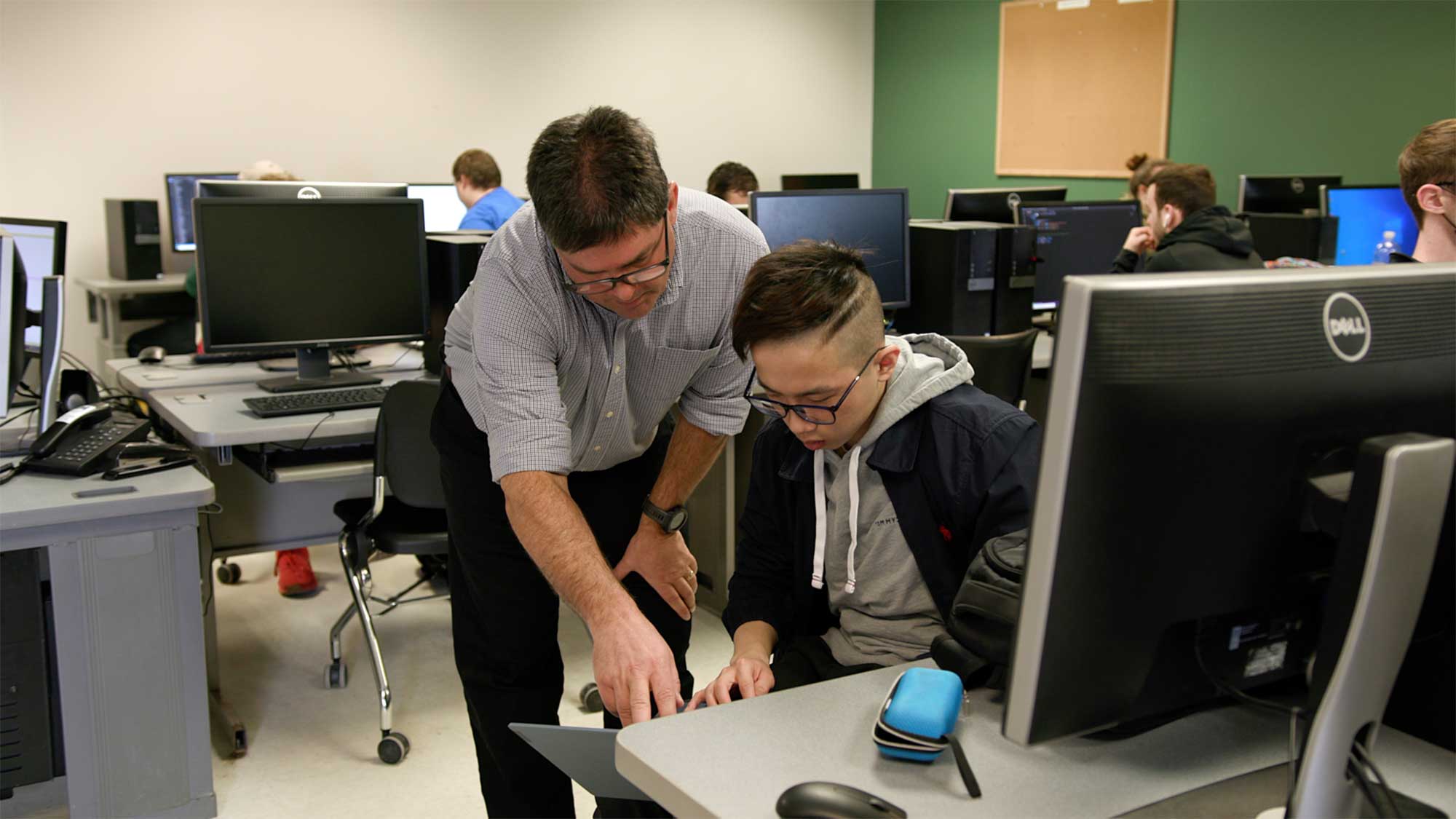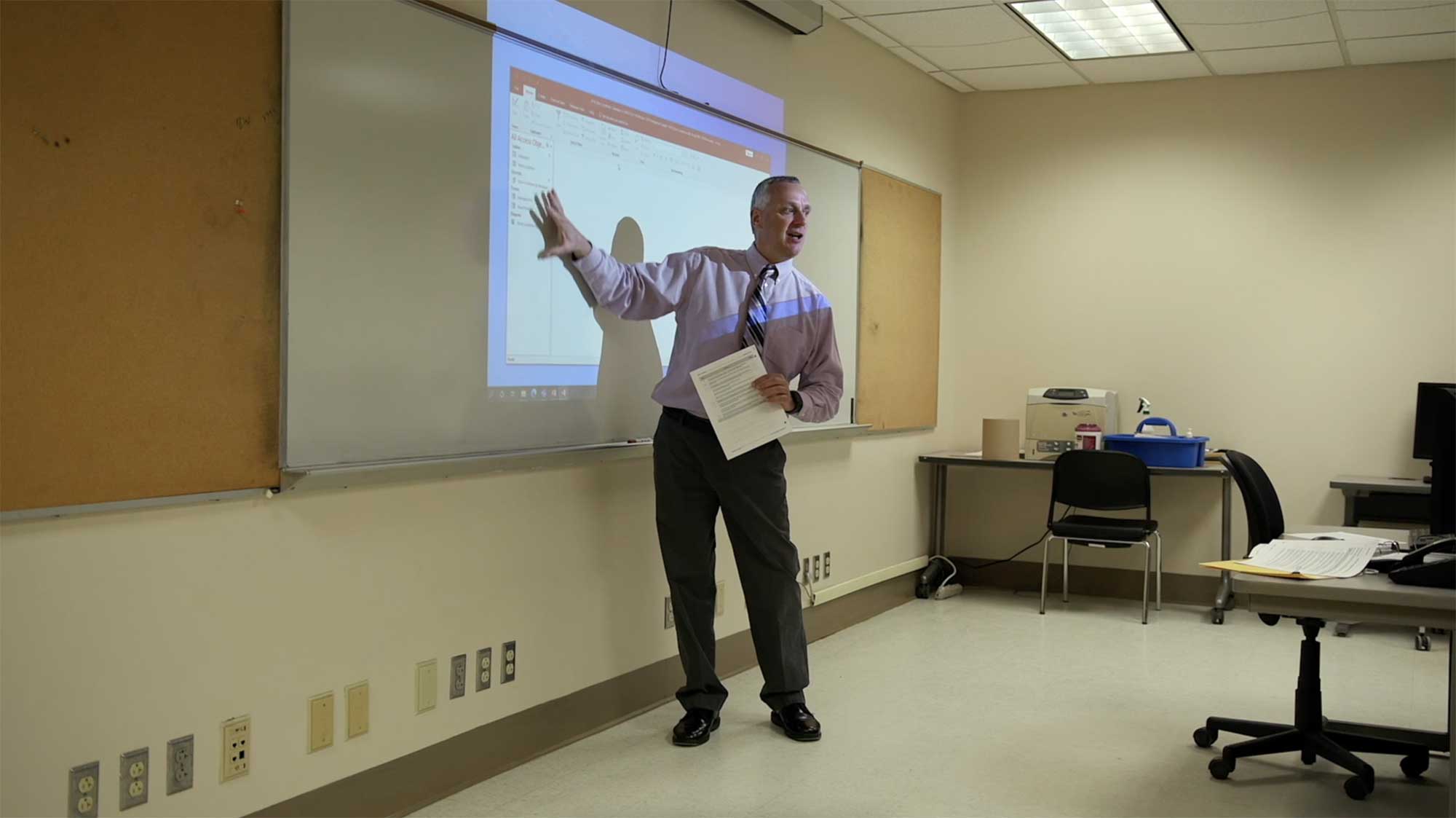Why study Computer Networking & Cybersecurity AS at FMCC
This program is designed for students who plan to transfer and continue their studies in programs leading to a Bachelor’s degree. The program combines computer information systems, liberal arts, and criminal justice coursework to prepare students for transfer to bachelor’s degree programs in Network Forensics, Information Assurance, Cybercrime Investigation, and related programs.
Request info for this program
Career Pathways
Our region boasts a wide variety of career opportunities with competitive salaries in computer networking and cybersecurity. The positions presented are the most common career pathways FMCC graduates have taken and are just a sample of the many career possibilities.
The labor market and employer information are specifically presented for the Amsterdam, Gloversville, Capital District, and the Mohawk Valley regions. Salary information is based on estimates within the Capital District.

MEDIAN SALARY
$102,461*
SALARY RANGE $59,862 - $143,437
Plan, implement, upgrade, or monitor security measures for the protection of computer networks and information. Assess system vulnerabilities for security risks and propose and implement risk mitigation strategies. (bls.gov)
Over 500 expected jobs in the region in the next 10 years.

MEDIAN SALARY
$59,876*
SALARY RANGE $36,179 - $106,665
Plan and carry out security measures to protect an organization’s computer networks and systems. (bls.gov)
Over 900 expected jobs in the region in the next 10 years.

MEDIAN SALARY
$81,982*
SALARY RANGE $61,984 - $113,187
Install, configure, and maintain an organization’s local area network, wide area network, data communications network, operating systems, and physical and virtual servers. Perform system monitoring and verify the integrity of hardware, network, and server resources and systems. (bls.gov)
Over 1,900 expected jobs in the region in the next 10 years.
Salary information presented are estimates and can be different for each individual based on education, experience, and the specific employer.
Labor market data is based on 2021 estimates derived from Lightcast (Career Coach | Lightcast)
Some of Our Regional Employers
Our commitment to your career path goes beyond the classroom with continued expansion of hands-on internships, job shadowing, and job placement opportunities with over 50 regional business and organization exclusive partners, a career network of over 200 regional companies and organizations; plus Annual Job Fairs every Spring semester.




Transfer Opportunities
Being part of the largest system of public higher education in the United States, the State University of New York, SUNY FMCC has established a multitude of transfer pathways for our students at both SUNY and Private schools. Below are some of our major transfer colleges and universities.
62 Credits
#1 PROGRAM
2 EXPERIENCED FACULTY
Program Insight
Graduates of the Computer Networking & Cybersecurity program have gone on to lucrative careers after transferring to 4-year colleges and universities. The education at SUNY FMCC provides a strong foundation in preparing you for future career success.
Learning Outcomes
Students will be able to:
-
Configure and Install end-user and server hardware and operating systems.
-
Identify system vulnerabilities and be able to assess cyber-related risks.
-
Analyze and utilize appropriate tools to protect network infrastructure and data.
-
Develop and implement proactive procedures and scripts to manage networked computers, servers and data.
Program Features
State-of-the-Art Computer & Cybersecurity Lab
With up-to-date software, hardware, and computer equipment for hands-on experience.
Hack FMCC Club
A student-run organization created to foster a community of individuals who solve problems through the innovative use of technology and spreads awareness of the rapidly growing software, networking, and cyber-security jobs available.
Experienced Faculty
Learn from dedicated professors who have years of experience working in the public and private IT sector.
Course Highlights
Course Catalog
SUNY FMCC offers its catalog online in a downloadable PDF document that makes information on programs, courses and policies most current and accessible, while reducing impact on the environment. Additional information is available on the College’s website and portal. To read and search the FMCC Catalog, you’ll need Adobe Reader version 7.0 or later.
2025-2026 FMCC CATALOGProgram Course Layout
Students will take foundational computer networking and cybersecurity classes to prepare them for transfer to four-year colleges and universities. Here are just some examples.
This course will introduce students to the basics of cryptography, security management, wireless networking, and organizational policy. Topics include operating system security, authentication, attacks, auditing, encryption, and physical security. This course introduces fundamental cybersecurity topics such as institutional security policy, legal aspects of security, computer system infrastructures, types of cyber threats and risk assessment, cryptography, information integrity, and data loss prevention.
This course enables students to recognize networking media and topology. Students will identify protocols and Open Systems Interconnections (OSI) models. Students will identify hardware and software problems of a network and provide network support. Installing and configuring the hardware and software on a local area network of computers is an integral part of the course. Students will install and use proprietary and opensource network operating systems.
This course introduces students to the basics of cryptography, security management, wireless networking, and organizational policy. Topics include operating system security, authentication, attacks, auditing, encryption, and physical security. The course will focus on management and troubleshooting concepts and tools such as tracert, nslookup, ipconfig, ping, DNS, and Denial of Service attacks. Additional topics include an overview of malware, disaster recovery, information security policy, and rules for avoiding viruses and vulnerabilities.







